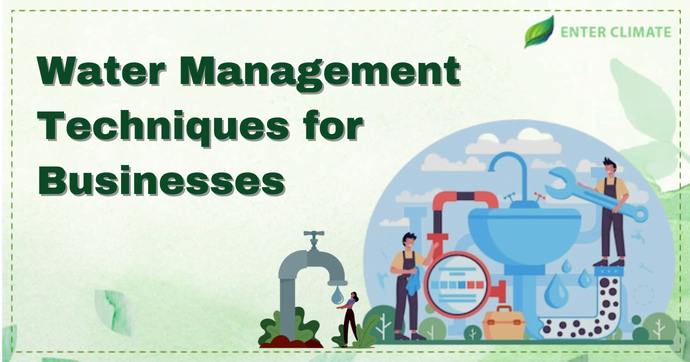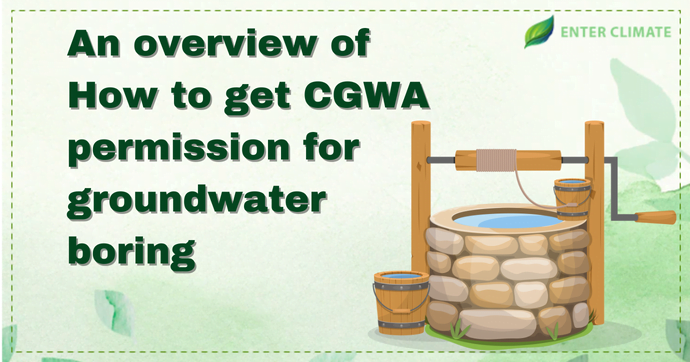Water Management Techniques for Businesses
 30 Jan, 2023
30 Jan, 2023 
Regulatory compliance, infrastructure, environmental stewardship and economic growth, and sustainability operation are the four major areas that define an industry’s operation. When considering ways to maximise profit, the industrial establishments considered the first two but often ignored the latter two. But this is different nowadays when effectively utilising water and energy resources has become critical to their operations. Many sectors, such as industry and agriculture, use water intensively. Both these sectors face a potential risk of water scarcity and therefore require diligence in managing water usage and wastewater discharge. Nowadays, compliance with ESG parameters and water use optimisation play a very important role in industrial plant design and their functioning. Therefore, industrial water management is a critical component of sustainable business practices and fulfilling ESG goals. Thus, the need for water management techniques in industrial units has gained importance in today’s time.
Draining away wastewater without treatment may seem like a cost-saving technique, but it costs businesses substantially in the long run. The government has implemented policies to promote water management techniques in industrial activities through various regulations such as the Water Act and the Environment (Protection)Act. These regulations are designed to ensure environmental compliance and improve the sustainable use of water resources, and manage the concentration of pollutants in wastewater discharges. The present legislation with regard to the use of water and the discharge of wastewater from industry is strictly governed under the above laws. Industries face many challenges when it comes to seeking permissions for the abstraction of groundwater and its discharge. The dwindling water reserves, uncertain availability and strict industrial wastewater discharge standards have made businesses rethink their water use and recycling strategies in their operation. Through this write-up, we will understand the importance of water management techniques in industrial sectors.
How Water Management Techniques can reduce Water Use in Industries
Water-intensive industries are primarily the chemical, metal mining, food and beverage, paper, and textile industries. Managing supply and demand in these industries is important for building a sustainable and regular water supply for hassle-free business conduct. The following are the approaches in water management techniques that can help reduce the demand for freshwater by industries.
- Designing of the industrial unit: Conducting feasibility studies on water management techniques, including problem identification, evaluation of alternate options with cost-benefit analysis and recommendation of optimum solutions for water management.
- Efficient Operation: Reducing water wastage through leaks, contamination, evaporation etc., need to be considered as the basics for water management technique to be implemented in an industrial sector.
- Recycling and reuse: The critical way to increase the efficiency of water management techniques is to reduce freshwater usage at the beginning. Recycling the water after treating and reusing it, thereby decreasing wastewater disposal. Integrating IoT-based innovative applications are available in the market to address this exact issue by fostering water reuse and integrating alternative water resources.
- Community Participation: As part of corporate social responsibility, businesses can set up water conversation projects in their community and conduct awareness programs. Water-intensive industries can also invest in water-saving innovations in the area, which will help reduce the demand for water in that region.
Importance of water management techniques in the Industrial Sector
Groundwater management, watershed development, water infrastructure, rainwater harvesting and climate risk and resilience are some critical areas where innovative technologies and practices can be applied in any industrial setup. Regular monitoring of the STPs and ETPs and conducting checks on the efficiency of boilers are also increasingly becoming a part of the business operation. Water management solutions reduce the cost of procuring water and make the process eco-friendly and sustainable. Water Treatment Plants, Sewage Treatment plants, Effluent Treatment Plants, Clarifies and Filters are being successfully implemented in industries in the country.
Now industries use smart sensor technology for water management to get real-time data that can drive or automate decisions, reduce costs and reduce the wastage of resources. Data collected with smart water devices are being integrated to show how much water is being used in different areas of the industrial plant and how one can target areas where one can use water more efficiently. According to some research, industrial plants can save up to 20% of their energy use by installing smart technologies and reducing water consumption by up to 30%, saving water in leaks and monitoring over-usage areas.
Popular water management Techniques in Industries
Smart meters and monitoring hubs that allow real-time water consumption measuring help identify excessive usage and waste points, provide correct usage patterns and predict future consumption. Using smart meters and consumption monitoring, tools can correct water consumption routines and reach sustainability and budgeting goals in the industrial sector. The popular water management techniques used today are
Rainwater Harvesting System (RWH): Storing water received in the form of rain is called rainwater harvesting. It collects and stores rain from a roof-like surface by redirecting it to tanks, cisterns, deep pits (well, shafts, or boreholes), aquifers, or reservoirs with percolation. RWH can be done through simple techniques such as direct-pumped harvesting setups (submersible or suction type).
Groundwater recharge: Groundwater recharge enhances natural groundwater supplies using artificial conveyances such as infiltration basins, trenches, dams, or injection wells.
Aquifer storage & recovery: Aquifer storage and recovery (ASR) is the injection of surface water supplies such as rainwater, potable water or river water into an aquifer for later use.
Desalination: Desalination is a process that removes mineral salts from sea (saline) water. Saline water is not fit for most industrial purposes. But if the industry is located in areas where saline water is present, it can invest in desalination plants to eliminate its dependency on freshwater altogether.
Judicious use of technology: Installation of water management techniques such as cooling towers to recycle water with an efficient refrigeration loop can save up to 25% of total water consumption.
Routine Checks: Installation of water pressure meters, flow meters and monitoring devices will help to identify leakage in pipes, joints or valves in boilers, tanks, reservoirs etc.
Minimal use in Cleaning: To reduce water consumption, industries can shift to vacuum cleaning instead of pressure cleaning or using non-water cleaning techniques. Water-saving toilet systems and tap aerators can also reduce water flow from the tap from high volume to high pressure and low volume. Industries can reuse non-potable water in the unit’s operation wherever possible.
Install treating/ Recycling Equipment: There is plenty of water conservation equipment available, like Effluent Treatment Plants (ETP), Sewage Treatment Plants (STP)[1], reverse osmosis systems etc., that can help industries recover water from the waste they generate. Removing contaminants from municipal sewage containing mainly household discharge plus nearby industrial wastewater can also be done if the ETP has excess filtration capacity.
Conclusion
Water reserves are depleting everywhere in the country at rates faster than they could be replenished, and soon businesses can face a severe shortage of this crucial resource. Therefore, several individuals, organisations and government departments have started incorporating water management techniques for judicious use. Currently, the need to optimise water usage and its discharge by specific industries is a cause of concern for many businesses today. This makes water management an issue that businesses cannot solve alone. There may come a time when they may have to stop their operation due to the unavailability of water. Therefore they must invest in optimisation strategies, wastewater treatment and recycling infrastructure by the time we have the chance. To implement effective water governance, a considerable number of challenges have to be addressed. Water management services can offer comprehensive water and wastewater management solutions through basic and detailed engineering, commissioning and monitoring operations.
Read our Article: An Overview Of How To Get CGWA Permission For Groundwater Boring












